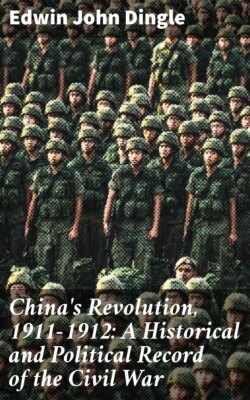Читать книгу China's Revolution, 1911-1912: A Historical and Political Record of the Civil War - Edwin John Dingle - Страница 5
На сайте Литреса книга снята с продажи.
CHAPTER III
GENERAL EXPECTATIONS
ОглавлениеTable of Contents
With the opening of China as a Republic the progress to be made in education will undoubtedly be stupendous. Missionaries will probably find an ever-increasing field. Missionaries and educationists will have a freer hand and be everywhere more greatly respected. They will play more than ever an increasing part in uplifting the people. Lord William Gascoign-Cecil has pointed out that if the West is to be saved she must illuminate China, and he says unless that vast country has attained the same standard as ourselves we must undergo a process of degradation. Our civilisation grew up, like our old towns, under the shadow of the Church; you will see in any country in Christendom the village clustering round the church, the town round the cathedral. Of late years big factory chimneys have been covered with the smoke of industry; still, they have left their mark as much on our civilisation as on our landscapes. But now a country which knows nothing of church or cathedral is entering into that civilisation, and the church and the cathedral become things of archæological interest and nothing more, unless, indeed, the Church will take the opportunity and conquer the industrial China that threatens the West.
"I do not mean," said Lord William Cecil, "only by sending out missionaries, but also by teaching the future rulers of this great industrial people the truth and value of a Christian civilisation. The pessimist says this is impossible, and thus sounds the knell of our social legislation; but the Christian says the world is built for progress, and the acquisition of China to our civilisation is our opportunity for making the world a happier place. If we could at this moment help the Chinese to value the high principles which underlie our Western thought, China might be rendered happy by the brilliant light of a Christian civilisation and the world saved from a disaster of having labour sink from a Christian to a semi-Oriental status."
And although the fall of the Manchu dynasty will open the pathway into real progress in this land, we must agree that there is an infinite pathos in the Child-Emperor, ignorant, innocent, abdicating the throne which his forefathers had won, a mere pawn in the game between Chinese and Manchus. But pathetic as this incident is, we must not let its pathos obscure in our minds its more important aspects; it is not only the abdication of an Emperor we have to consider, but it is also the destruction of the conventional and artificial Chinese civilisation before the vigorous civilisation of the West. Vast China, with its four hundred millions of industrious population, with its infinite resources of coal, iron, and other minerals, with its traditions of Confucianism, Taoism, and Lamaism, has become part, and a very large part, too, of Western civilisation.
We are indeed, during our generation, watching the making of history wonderful in its possibilities. The following quotation from the writer quoted may be intensely prophetic:—
"We are opening a new volume in the history of the world—a volume in which strange and terrible things may be written; a volume which, on the other hand, may contain a brighter story than any of us conceive to be possible. How one longs to read that volume as it will be written by the historian a hundred or two hundred years hence! Will it run thus: 'From this time the condition of the working class of Europe began steadily to deteriorate, and though the short-sighted statesmen of the twentieth century failed to appreciate it, this was the inevitable result of adding to the working men of the world a population remarkable for its industry and so inured to poverty that its workers gladly submitted to conditions which the Western workmen naturally and with justice refused'? Or will it run thus: 'The decadent Christianity of the West, corrupted by luxury, divided by sectional strife, received new life under the influence of the more sincere Chinese Christianity, purified in the harsh school of persecution and stimulated by the great political upheaval which caused the deposition of the Manchu Emperor'?"
We cannot take down the volume, we cannot read to the end; we must wait as year after year the pages are turned over, but we shall do well to appreciate the importance of this page of contemporary history.
China now will undergo before our very eyes a social and commercial and educational transformation, and so speedily will events in the main transpire that if one is to get the historical march of events fixed in his mind it is necessary to read at once what has passed. As soon as any national event passes now it falls speedily back into history. We cannot keep pace with all that transpires. Changes pass even us who live in China for the most part unnoticed. The face of China whilst we look upon it takes on a new appearance.
It is well that we should read of the doings leading up to this great era of transition.
